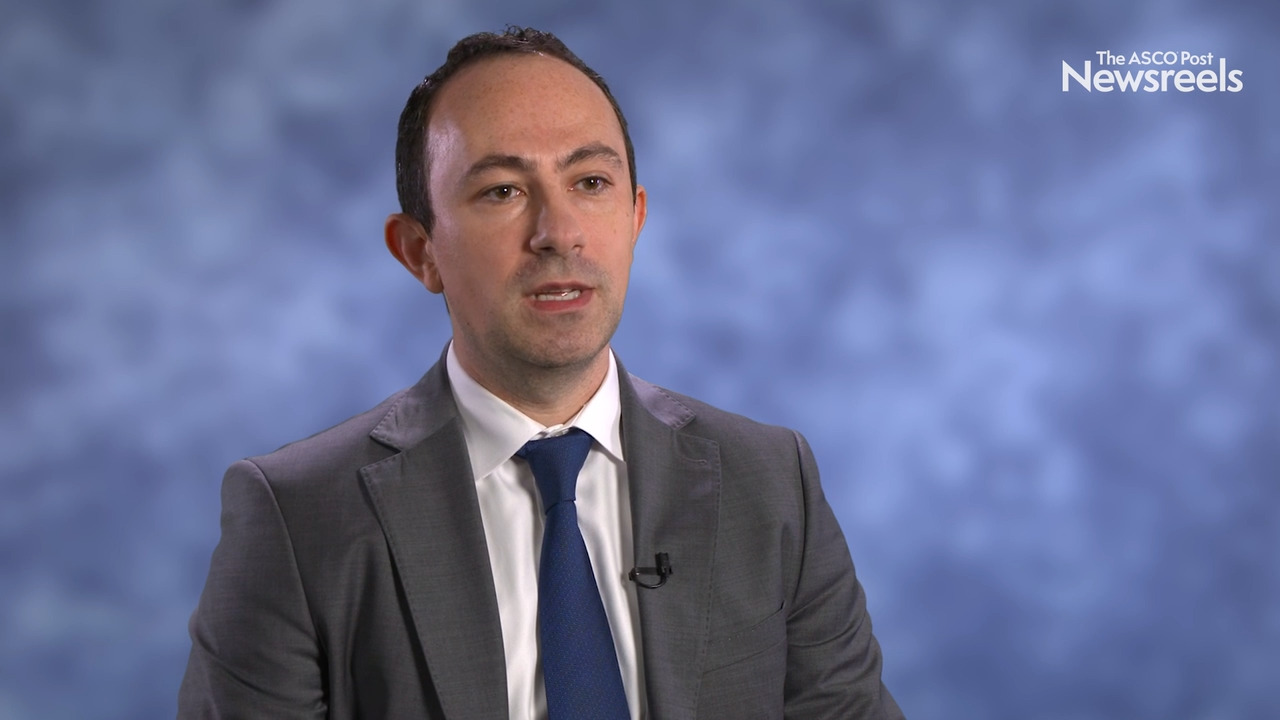Evorpacept Alone and Combined With Pembrolizumab or Trastuzumab for Advanced Solid Tumors
In the phase I ASPEN-01 study reported in The Lancet Oncology, Nehal Lakhani, MD, and colleagues found evidence of activity of the CD47-blocking protein evorpacept in combination with pembrolizumab or trastuzumab for the treatment of advanced solid tumors. As stated by the investigators, “Both...
Newer Agents on the Horizon for Refractory or Relapsed DLBCL
Although treating patients with relapsed or refractory diffuse large B-cell lymphoma (DLBCL) remains challenging, some newer therapies on the horizon offer promise, including bispecific antibodies, anti-CD47 antibodies, antibody-drug conjugates, and chimeric antigen receptor (CAR) T-cell therapy,...
FDA Approves Pembrolizumab for Adjuvant Treatment of Renal Cell Carcinoma
On November 17, the U.S. Food and Drug Administration (FDA) approved pembrolizumab (Keytruda) for the adjuvant treatment of patients with renal cell carcinoma (RCC) at intermediate-high or high risk of disease recurrence following nephrectomy or nephrectomy and resection of metastatic lesions....
Study Explores Method to Selectively Grow Tumor-Targeting T Cells for Cancer Therapy
A preclinical study published by Arnaud et al in Nature Biotechnology has demonstrated the utility and efficacy of a highly efficient method to generate large numbers of immune cells specifically engineered to recognize neoantigens and destroy the tumors that express them. Developed by a team of...
Health-Related Quality of Life With Pembrolizumab vs Chemotherapy for Advanced Esophageal Cancer
In a study reported in the Journal of Clinical Oncology, Adenis et al found that health-related quality of life was maintained with both pembrolizumab and chemotherapy in the pivotal phase III KEYNOTE-181 trial, which included patients with advanced esophageal cancer who had received previous...
FDA Pipeline: Novel Treatments in Lymphoma, Nasopharyngeal Cancer, Solid Tumors, and More
Recently, the U.S. Food and Drug Administration (FDA) granted Priority Review to agents for several kinds of lymphoma, as well as nasopharyngeal cancer; a Breakthrough Therapy designation for a treatment for patients with NTRK-positive advanced solid tumors; and Fast Track designation for...
Nivolumab for Relapsed Malignant Mesothelioma: Improvements in Progression-Free and Overall Survival
In the phase III CONFIRM trial reported in The Lancet Oncology, Dean A. Fennell, FRCP, PhD, and colleagues found that nivolumab improved progression-free and overall survival vs placebo in patients with relapsed malignant mesothelioma. In October 2020, the combination of nivolumab and ipilimumab...
Youssef Zeidan, MD, PhD, on HER2-Positive Breast Cancer: Treatment-Related Cardiotoxicity
Youssef Zeidan, MD, PhD, of Florida International University and the Lynn Cancer Institute, discusses the advances in radiotherapy planning and delivery that have reduced cardiac radiation exposure in patients with HER2-positive breast cancer who are treated with radiotherapy and trastuzumab (Abstract 12).
Hope S. Rugo, MD, on Triple-Negative Breast Cancer: Treatment Findings From KEYNOTE-355 on Pembrolizumab and Chemotherapy
Hope S. Rugo, MD, of the University of California, San Francisco, discusses phase III results from the KEYNOTE-355 study of pembrolizumab plus chemotherapy, which improved overall survival vs chemotherapy alone in patients with previously untreated locally recurrent, inoperable, or metastatic triple-negative breast cancer whose tumors expressed PD-L1 (Abstract LBA16).
Expert Point of View: Omid Hamid, MD
Commenting on the SECOMBIT trial was Omid Hamid, MD, Chief of Translational Research and Immunotherapy at The Angeles Clinic & Research Institute, a Cedars-Sinai Affiliate, and Co-Director, Cutaneous Malignancy Program, Cedars-Sinai Cancer. Dr. Hamid said SECOMBIT addresses an important...
SECOMBIT Trial Evaluates Optimal Treatment Sequencing in BRAF-Mutated Melanoma
Patients with untreated, metastatic BRAF-mutated melanoma may benefit from receiving immunotherapy first, moving to targeted therapy in the second line, data from the updated overall survival analysis of the randomized, phase II SECOMBIT trial suggest.1 The study aimed to define the optimal...
Another Antibody-Drug Conjugate Enters the Metastatic Breast Cancer Landscape
In the global phase III TULIP trial in metastatic HER2-positive breast cancer, treatment with the antibody-drug conjugate vic-trastuzumab duocarmazine (SYD985) significantly improved progression-free survival in comparison with standard chemotherapy in previously treated patients, making this a new ...
Two Studies Examine the Efficacy of Immunotherapy for Leptomeningeal Carcinomatosis
Two new studies published in Nature Communications indicate that immunotherapy may benefit people with leptomeningeal carcinomatosis, a rare but serious complication of cancer that has spread to the brain and/or spinal cord. Approximately 5% to 8% of all patients with cancer develop leptomeningeal ...
Overall Survival in the MAIA Trial: Daratumumab, Lenalidomide, and Dexamethasone for Newly Diagnosed Transplant-Ineligible Patients With Multiple Myeloma
As reported in The Lancet Oncology by Thierry Facon, MD, and colleagues, an interim analysis of overall survival in the pivotal phase III MAIA trial has shown a significant benefit with the addition of daratumumab to lenalidomide/dexamethasone in newly diagnosed, transplant-ineligible patients with ...
Nivolumab/Low-Dose Ipilimumab Produces Responses in Patients With MSI-H/dMMR Metastatic Colorectal Cancer
As reported in the Journal of Clinical Oncology by Heinz-Josef Lenz, MD, and colleagues, in the phase II CheckMate 142 trial, first-line treatment with nivolumab plus low-dose ipilimumab produced a high rate of durable responses in a cohort of patients who had received no prior treatment for...
Susana N. Banerjee, MBBS, PhD, on Ovarian, Fallopian Tube, or Primary Peritoneal Adenocarcinoma: Treatment Findings From the EORTC-1508 Trial
Susana N. Banerjee, MBBS, PhD, of The Royal Marsden NHS Foundation Trust, discusses phase II results of the EORTC-1508 trial, the first study to combine an anti–PD-L1 antibody, atezolizumab, with bevacizumab and the COX1/2 inhibitor acetylsalicylic acid as treatment for patients with ovarian, fallopian tube, or primary peritoneal adenocarcinoma (Abstract LBA32).
Filippo Pietrantonio, MD, and Federica Morano, MD, on Colorectal Cancer and the MAYA Trial Strategy: Temozolomide, Ipilimumab, and Nivolumab
Filippo Pietrantonio, MD, and Federica Morano, MD, both of the Istituto Nazionale dei Tumori, discuss results from the MAYA trial, which provided proof of concept that temozolomide-induced hypermutation may be exploited to achieve durable responses to low-dose ipilimumab plus nivolumab in patients with microsatellite stable metastatic colorectal cancer (Abstract 383O).
Neeraj Agarwal, MD, on Advanced Prostate Cancer: Data on Cabozantinib Plus Atezolizumab
Neeraj Agarwal, MD, of Hunstman Cancer Institute at the University of Utah, discusses efficacy and safety results from the COSMIC-021 study, in which cabozantinib plus atezolizumab demonstrated clinically meaningful activity and a manageable safety profile in patients with metastatic castration-resistant prostate cancer. The findings support a phase III study of these agents vs a second line of novel hormonal therapy (Abstract LBA24).
FDA Approves Atezolizumab as Adjuvant Treatment for NSCLC
On October 15, the U.S. Food and Drug Administration (FDA) approved atezolizumab (Tecentriq) for adjuvant treatment following resection and platinum-based chemotherapy in patients with stage II to IIIA non–small cell lung cancer (NSCLC) whose tumors have PD-L1 expression on ≥ 1% of tumor cells, as...
FDA Approves Pembrolizumab Combination for the First-Line Treatment of Cervical Cancer
On October 13, the U.S. Food and Drug Administration (FDA) approved pembrolizumab (Keytruda) in combination with chemotherapy, with or without bevacizumab, for patients with persistent, recurrent, or metastatic cervical cancer whose tumors express PD-L1 (combined positive score [CPS] ≥ 1), as...
Camrelizumab/Apatinib for High-Risk Chemorefractory or Relapsed Gestational Trophoblastic Neoplasia
In a Chinese single-institution phase II trial (CAP 01) reported in The Lancet Oncology, Cheng et al found that the PD-1 inhibitor camrelizumab in combination with the antiangiogenic agent apatinib produced a high rate of complete responses in women with high-risk chemorefractory or relapsed...
Neoadjuvant Atezolizumab Under Study in Mesothelioma
Neoadjuvant atezolizumab combined with pemetrexed and cisplatin, with maintenance atezolizumab, proved to be safe and feasible, offering a hint of benefit in patients with resectable pleural mesothelioma, in a small multicenter study presented at the International Association for the Study of Lung...
Expert Point of View: Omid Hamid, MD
“The U.S. Food and Drug Administration is currently examining pembrolizumab for the adjuvant treatment of stage IIB and IIC melanoma; if approved, we would be introducing immunotherapy earlier in the patient journey,” commented invited discussant Omid Hamid, MD (@OmidHamidMD), who was an...
Adjuvant Pembrolizumab Shows Efficacy in High-Risk Stage II Melanoma in Adults and Children Older Than 12
Adjuvant pembrolizumab reduced the risk of recurrence in adults and children older than age 12 with high-risk stage II (AJCC 8th edition, stage IIB/IIC) melanoma vs placebo, according to a late-breaking interim analysis of the phase III KEYNOTE-716 trial, presented during the European Society for...
Expert Point of View: Mansoor Raza Mirza, MD
“The standard of care [in advanced cervical cancer] has been the addition of bevacizumab to platinum-based chemotherapy since 2014. Even with the addition of bevacizumab, we still need to do better. There is a substantial unmet need for new therapies,” said invited discussant Mansoor Raza Mirza,...
Study Shows Pembrolizumab Plus Chemotherapy Improves Survival in Advanced Cervical Cancer
The addition of pembrolizumab to chemotherapy prolonged survival in recurrent, persistent, or metastatic cervical cancer, according to the results of the first interim analysis of the KEYNOTE-826 trial, presented at a Presidential Symposium during the European Society for Medical Oncology (ESMO)...
Expert Point of View: Ichiro Yoshino, MD, PhD
Ichiro Yoshino, MD, PhD, Professor and Chairman of the Department of General Thoracic Surgery, Chiba University Graduate School of Medicine, Japan, reviewed the finer details of the IMpower010 exploratory analysis.1 He maintained that atezolizumab’s benefit does, indeed, seem to favor some patient...
IMpower010: Benefits Observed With Atezolizumab Regardless of Stage, Type of Prior Treatment
In an exploratory analysis of the pivotal phase III IMpower010 trial in stage II–IIIA non–small cell lung cancer (NSCLC), continued treatment with the monoclonal antibody atezolizumab after surgery and chemotherapy improved disease-free survival regardless of the type of surgery or chemotherapy...
Expert Point of View: Shanu Modi, MD
Shanu Modi, MD, of the Breast Medicine Service at Memorial Sloan Kettering Cancer Center, New York, called the DESTINY-Breast03 results,1 which showed a highly significant benefit for fam-trastuzumab deruxtecan-nxki (T-DXd) over trastuzumab emtansine (T-DM1), “unprecedented.” She suggested they...
DESTINY Breast03 Trial Supports Second-Line Use of T-DXd in Metastatic HER2-Positive Breast Cancer
The antibody-drug conjugate fam-trastuzumab deruxtecan-nxki (T-DXd) may become a new option as a second-line treatment of patients with HER2-positive unresectable or metastatic breast cancer, based on results from the global phase III DESTINY-Breast03 trial. These findings were presented by Javier...
FDA Pipeline: Recent Reviews, Designations, Applications, and Authorizations in the Oncology Space
Over the past month, the U.S. Food and Drug Administration (FDA) issued several regulatory decisions for novel treatments for patients with cancer. Priority Review for Relatlimab and Nivolumab Fixed-Dose Combination in Unresectable or Metastatic Melanoma The FDA accepted for Priority Review the...
Jyoti Patel, MD, Offers Thoughts on Maintenance Durvalumab Utilization
Study discussant Jyoti Patel, MD, Medical Director of Thoracic Oncology and Assistant Director for Clinical Research at the Lurie Cancer Center of Northwestern University, Chicago, called the research “important for many reasons.” Although the study analyzed data from both open and closed claims,...
Maintenance Durvalumab: Increased Utilization May Improve Outcomes in NSCLC
Maintenance durvalumab, the standard-of-care treatment for patients with unresectable stage III non–small cell lung cancer (NSCLC), remains significantly underutilized, according to data presented at the International Association for the Study of Lung Cancer (IASLC) 2021 World Conference on Lung...
Tackling a Growing Need: Options After CAR T-Cell Therapy for Lymphoma
For aggressive B-cell lymphomas, chimeric antigen receptor (CAR) T-cell therapy saves lives, but relapse remains common, and a second-line standard of care is lacking. During the 2021 Pan Pacific Lymphoma Conference, Grzegorz (Greg) S. Nowakowski, MD, Professor of Medicine and Oncology, Lymphoma...
Black Patients With Advanced NSCLC Receiving Immunotherapy May Have a Lower Risk of Death Than White Patients
Collectively, Black Americans have the highest death rate and shortest survival of any racial/ethnic group in the United States for most cancers; Black men also have the highest cancer incidence rate. Despite improvements in survival disparities between Black and White Americans in specific cancers ...
Rates of Postprotocol Immunotherapy Use in Patients Enrolled in Kidney Cancer Clinical Trials
In an analysis reported in JAMA Network Open, Sharp et al identified the frequency of use of postprotocol PD-1/PD-L1 inhibitors in control group patients receiving the tyrosine kinase inhibitor sunitinib in randomized trials comparing PD-1/PD-L1 inhibitor–containing combination therapy vs sunitinib ...
Adjuvant Atezolizumab Following Adjuvant Chemotherapy for Resected Stage IB to IIIA NSCLC
In the phase III IMpower010 trial reported in The Lancet, Enriqueta Felip, MD, and colleagues found that the use of adjuvant atezolizumab after adjuvant platinum-based chemotherapy significantly improved disease-free survival vs best supportive care in patients with resected stage II to IIIA...
A Look at Tomorrow’s CAR T-Cell Therapy Today
Some of the most impressive data on chimeric antigen receptor (CAR) T-cell therapy have come from studies conducted in China. Attendees at the 2021 Pan Pacific Lymphoma Conference heard from one of the leading Chinese investigators, Peihua (Peggy) Lu, MD, of Lu Daopei Hospital, who described the...
Axicabtagene Ciloleucel for Adult Patients With Primary Mediastinal B-Cell Lymphoma: Real-World Outcomes
In a retrospective cohort study reported in a research letter in Blood Advances, Jennifer L. Crombie, MD, and colleagues found that axicabtagene ciloleucel produced high overall and complete response rates in patients with primary mediastinal B-cell lymphoma. They also observed some evidence to...
FDA Approves Brexucabtagene Autoleucel for Relapsed or Refractory B-Cell Precursor ALL
On October 1, the U.S. Food and Drug Administration (FDA) approved brexucabtagene autoleucel (Tecartus), a CD19-directed chimeric antigen receptor (CAR) T-cell therapy, for adult patients with relapsed or refractory B-cell precursor acute lymphoblastic leukemia (ALL). ZUMA-3 Efficacy was evaluated ...
Liver Biopsy for Evaluation of Hepatitis Associated With Immunotherapy
In a retrospective cohort study reported in a research letter in JAMA Oncology, Li et al found that the performance of liver biopsy in patients with grade ≥ 3 alanine aminotransferase (ALT) elevations during immune checkpoint inhibitor therapy was associated with a delayed start of corticosteroid...
Nasser K. Altorki, MD, on NSCLC: Adjuvant Atezolizumab for Stage IB–IIIA Disease
Nasser K. Altorki, MD, of Weill Medical College of Cornell University and NewYork-Presbyterian Hospital, discusses phase III data from the IMpower010 study, which showed that, compared with best supportive care, atezolizumab improved disease-free survival in patients with stage II–IIIA non–small cell lung cancer. These findings applied across most disease stages and most surgery types and chemotherapy regimens, as well as in patients with nodal involvement (Abstract PL02.05).
CASSIOPEIA Part 2: Maintenance Daratumumab After Initial Therapy for Newly Diagnosed Multiple Myeloma
As reported in The Lancet Oncology by Philippe Moreau, MD, and colleagues, an interim analysis of part 2 of the phase III CASSIOPEIA trial has shown significantly prolonged progression-free survival with maintenance daratumumab vs observation following induction and consolidation with or without...
Pembrolizumab and Lenvatinib in Advanced Endometrial Carcinoma
On July 21, 2021, pembrolizumab in combination with lenvatinib was granted regular approval for treatment of patients with advanced endometrial carcinoma that is not microsatellite instability–high or mismatch repair–deficient who have disease progression following prior systemic therapy in any...
Nivolumab for Adjuvant Treatment of Urothelial Carcinoma
On August 19, 2021, the PD-1 inhibitor nivolumab was approved for adjuvant treatment of patients with urothelial carcinoma who are at high risk of recurrence after undergoing radical resection.1 This is the first approval by the U.S. Food and Drug Administration for adjuvant treatment of patients...
Lenvatinib Plus Pembrolizumab for First-Line Treatment of Advanced Renal Cell Carcinoma
On August 10, 2021, the combination of lenvatinib plus pembrolizumab was approved for first-line treatment of adults with advanced renal cell carcinoma.1,2 Supporting Efficacy Data Approval was based on findings from the three-arm, open-label, phase III CLEAR trial (Study 307/KEYNOTE-581;...
Saad Z. Usmani, MBA, MD, on Multiple Myeloma: Updated Results From the CARTITUDE-1 Study of Ciltacabtagene Autoleucel
Saad Z. Usmani, MBA, MD, of the Levine Cancer Institute, discusses new data on the CAR T-cell therapy ciltacabtagene autoleucel, a single infusion of which yielded early, deep, and durable responses in heavily pretreated patients with relapsed or refractory multiple myeloma (Oral Abstract MM-119).
Dostarlimab-gxly for Mismatch Repair–Deficient Recurrent or Advanced Solid Tumors
On August 17, 2021, dostarlimab-gxly, aPD-1 blocking monoclonal antibody, was granted accelerated approval for adults with mismatch repair–deficient (dMMR) recurrent or advanced solid tumors, as determined by a U.S. Food and Drug Administration (FDA)-approved test, who have had disease progression...
Lymphoid Malignancies: What’s Next for Antibody-Drug Conjugates?
Antibody-drug conjugates are improving outcomes of patients with lymphoma, often those who have exhausted treatment options after chimeric antigen receptor (CAR) T-cell therapy. Four available antibody-drug conjugates are in the clinic, with brentuximab vedotin moving into the front-line...
Long-Term Outcomes in JULIET Trial of Tisagenlecleucel for Relapsed or Refractory Aggressive B-Cell Lymphomas
As reported by Stephen J. Schuster, MD, and colleagues in The Lancet Oncology, long-term outcomes of the pivotal phase II JULIET trial showed overall and complete response rates of 53% and 39% in adult patients with relapsed or refractory aggressive B-cell lymphomas treated with the T-cell...







